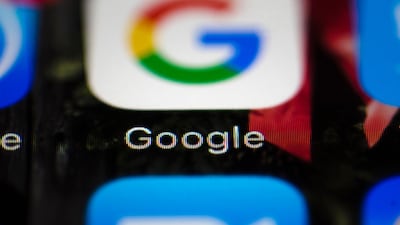Google is still raking in marketing dollars from advertisers, propelling the online search giant to another strong quarter in the face of costly regulatory trouble in Europe. The shares jumped as much as 6.1 percent, putting them on course for a record.
Parent company Alphabet reported second-quarter sales, minus partner payouts, of $26.24 billion. Analysts were expecting revenue of $25.55 billion, according to data compiled by Bloomberg. Google’s advertising business grew 24 percent. CFO Ruth Porat said most of that came from mobile and automated ads.
Google has continued to give search ads more prominent space on mobile phones, helping to fuel the brisk sales growth. Spending on Google Shopping search ads, which let marketers promote consumer products, increased 31 percent in the second quarter from a year earlier, according to data from digital marketing firm Merkle. Those gains came even as Amazon.com revs up its own ads business.
Alphabet reported two different profit figures to account for a $5 billion fine the European Union imposed last week for violating competition law with Google’s Android mobile software. Excluding that, Alphabet said profit was $11.75 a share. Google plans to contest the ruling. Even including the record fine, the company generated $3.2 billion in net income during the second quarter.
Google also shrugged off the General Data Protection Regulation, a European privacy law that started in May and limits targeted advertising. Similarly, analysts don’t expect EU antitrust probes to force changes that significantly dent Google earnings. “The Android fine may suggest that peak regulatory risk is now in the rearview mirror,” Mark Mahaney of RBC Capital Markets wrote in a note before Monday’s results.
A larger share of Google’s ad dollars went to its own digital properties, including the search engine and video service YouTube, rather than outside websites that run its ads. Google properties revenue jumped 26 percent to $23.3 billion. That leap reflects a recent push by Google to get marketers buying across more of its advertising channels. “They’re using the packaged deal, with all their properties, with a much stronger sell,” said Marco Rimini, chief development officer at WPP’s Mindshare media agency.
Some in the industry also cite GDPR, which convinced more advertisers to funnel ad spending to Google and its main rival Facebook. “One of the unintentional consequences of GDPR is the strengthening of the duopoly,” said Gil Elbaz, a former Google executive who now runs the marketing firm Factual. “If Google continues to go unchecked, their dominance will be extreme.”
While second-quarter sales jumped, so did costs for the technology giant. Google’s capital spending climbed to $5.3 billion, up 87 percent from the same period in 2017. On a call with analysts, CFO Porat highlighted spending on sales and marketing for Google’s cloud division, which is hosting its marquee conference later this week.
The sums Google pays out to websites and mobile partners to distribute its search engine and ads – called Traffic Acquisition Costs – also rose to $6.4 billion for the quarter. Still, that was 23 percent of ad revenue, down from 24 percent in the first quarter of 2018.
“TAC came in lower than expectations which is a clear positive takeaway from the quarter,” Dan Ives, head of technology research at GBH Insights, wrote in a note to investors.
Investors are also looking for signs of growth beyond advertising, such as Google’s cloud-computing business. The company’s other revenue bucket, which includes cloud, hardware and app sales, grew 37 percent to $4.4 billion in the second quarter.
Other Bets, the home of Google’s riskier, experimental businesses, lost $732 million in the quarter, versus a loss of $633 million in the same period a year earlier.

